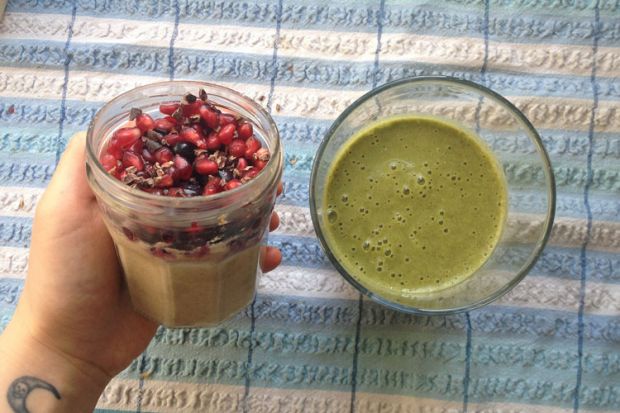What you eat for breakfast may not merit space on your CV, but a new website called Academic Breakfast is based on the idea that it matters how professors start their day.
The website invites academics to post a photograph of their breakfast, and to answer six quick questions: where they live, their institution, their job, their research in five words, their breakfast in five words, and their food philosophy in 10 words.
Many of the philosophies mix the importance of doing the right thing in terms of nutrition and the environment, but also enjoying food.
Among the food philosophies shared are “eat healthily but indulge your honest cravings without any guilt” (from a McGill University graduate student) and “Treat the planet and all beings well; have pleasure” (from a California State University at San Marcos sociologist and performance artist).
While there are plenty of healthy foods visible, one can also spot breakfast items - Diet Coke, cold pizza - that might not appear on nutritionists’ recommendations for the morning. Several people included shots of their morning pills. And while most of the photographs depict the food before anyone started eating, there are also shots that were taken mid-meal.
Lucas Crawford, the Ruth Wynn Woodward lecturer in gender, sexuality, and feminist studies at Simon Fraser University, in Vancouver, is behind the new project, which is part of Fat Matters, a broader project at the university of food and related issues. The site debuted in last April, originally attracting local submissions, but now is receiving breakfast photographs from academics in the United States, Australia, the UK, Chile, the Netherlands and elsewhere.
On the site, Dr Crawford outlines six reasons for the project:
- To remind ourselves that eating is a public matter.
- To see how food habits may differ across rank, region, nation and gender.
- To test our hypotheses about social class, precarious work and food access.
- To demystify academia by entering its intimate spaces and nourishing scenes.
- To remember that academics are bodies.
- To produce an alternative aesthetic representation of academic life.
Asked in an email interview what trends he has spotted in the academic breakfasts, Dr Crawford said that “the main trend that others have noticed is the preponderance of bananas and smoothies. For my part, I have been delighted and surprised by the variety of breakfasts on display – in not just the food itself but also in the various kinds of mornings that the pictures imply.
“We see smoothies consumed next to laptops and tofu eaten at one’s office, and we also see tables bedecked with ten toast condiments, meals that hint at morning cooking rituals, and plates lined with pills. The food evokes bodies and acts without confirming them.”
Dr Crawford added that a surprise has been in the answers on food philosophy. “I’ve been interested that many folks have described their general practices rather than ‘philosophise’ per se. (No critique implied – the question was deliberately open.)
“Of course, any practice implies a philosophy, but how precisely does this implication function? The perhaps impossible translation between ‘philosophical’ and ‘practical’ approaches to food is one of the subtle but important themes of the site. I hope that the ‘food philosophy’ question can get us thinking about which epistemologies we believe are relevant to food and which might deserve to become more relevant. What if aesthetic theory were the beginning point of one’s food philosophy – or, phenomenology, queer theory, gender studies, or literary theory?”
The website does not yet feature an entry from Dr Crawford. For those interested, he’s been eating for the past several months scrambled eggs, turkey bacon, toast, and a mixed berry smoothie. And he wants to hear from you about what you ate this morning.
Register to continue
Why register?
- Registration is free and only takes a moment
- Once registered, you can read 3 articles a month
- Sign up for our newsletter
Subscribe
Or subscribe for unlimited access to:
- Unlimited access to news, views, insights & reviews
- Digital editions
- Digital access to THE’s university and college rankings analysis
Already registered or a current subscriber? Login
